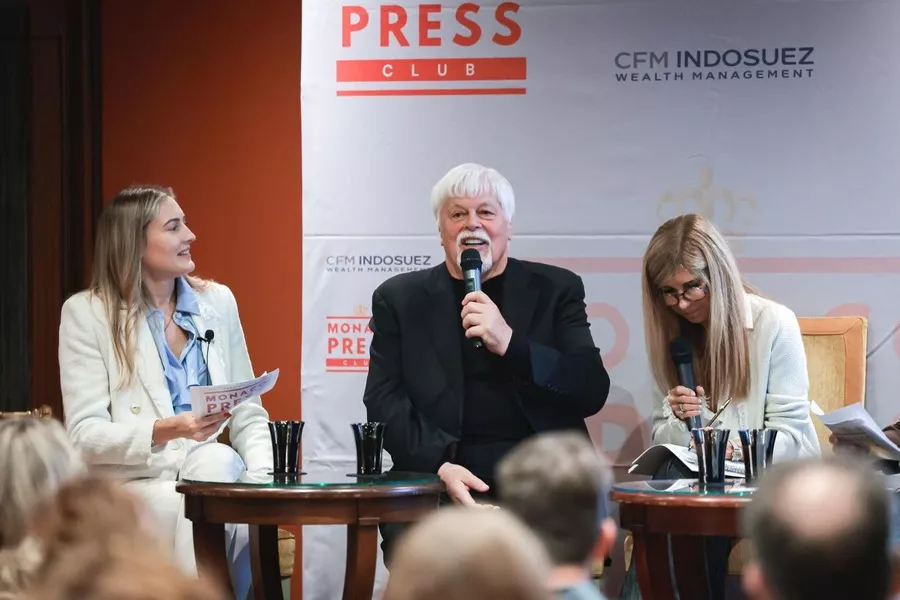Captain Paul Watson doesn’t wear a cape, but he’s been called a hero. He’s also been labelled a pirate, a terrorist, a troublemaker. Sitting across from him in Monaco, however, you meet a man who is remarkably calm, reflective, and poetic. The 73-year-old has spent his life in service of the sea — chasing whalers, confronting navies, ramming illegal ships, getting arrested, and, more recently, writing poetry.
“I’ve been doing this since I was 10,” he tells me ahead of a talk at the Monaco Press Club. “That summer, I spent every day swimming with a family of beavers in New Brunswick. But the next year, they were gone. Trapped. Killed. That made me angry, so I started walking traplines, freeing animals and destroying traps. I guess I’ve been doing the same thing ever since.”
Watson’s unwavering sense of justice has been his compass. As a co-founder of Greenpeace and the founder of Sea Shepherd, his legacy is filled with controversy, conviction, and results. Now, through the Captain Paul Watson Foundation, he’s continuing the fight — more focused than ever.
Aggressive Non-Violence
Watson’s split from Greenpeace in the 1970s came down to philosophy. Greenpeace, guided in part by Quaker principles, encouraged “bearing witness” but not taking action. That didn’t sit well with Watson.
“One day, during the seal campaign, a sealer was about to kill a pup. I grabbed his club, threw it in the ocean, and rescued the seal. Greenpeace said they couldn’t support what I had done. I said, ‘Well, I’d do it again.’” And so I left.
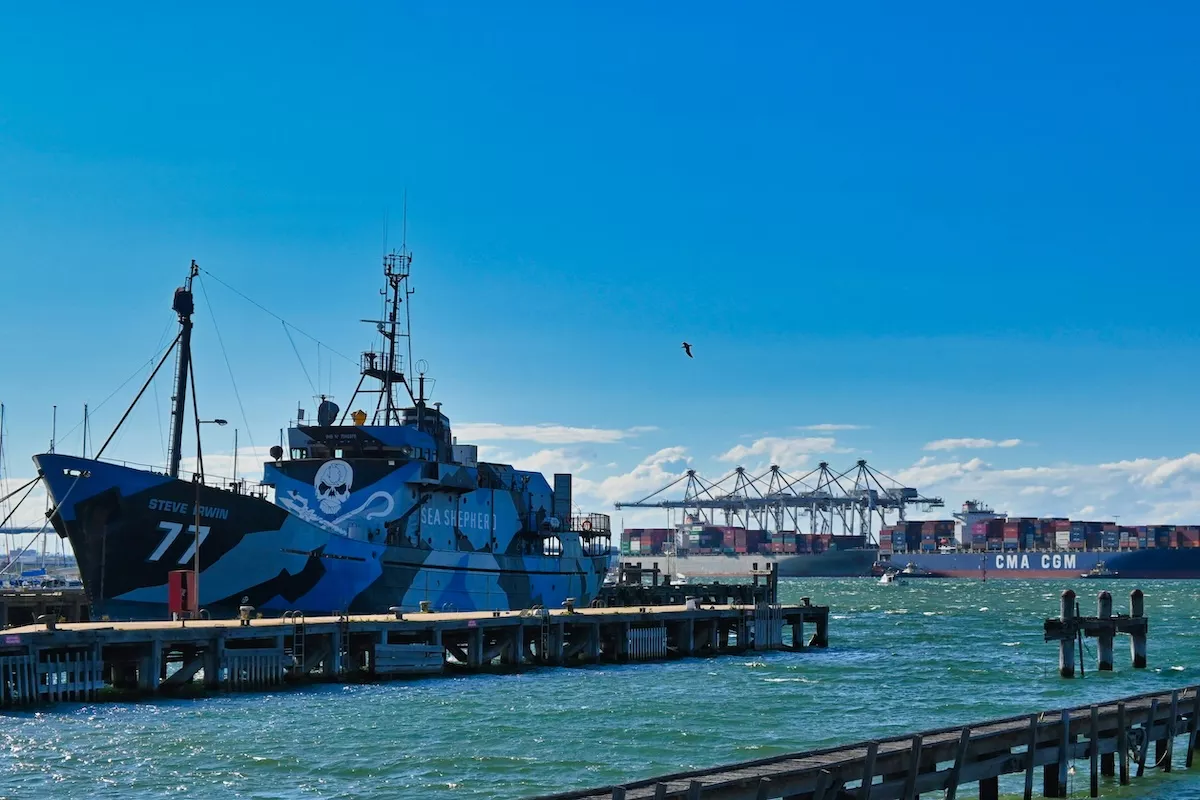
That break led to the formation of Sea Shepherd and a new strategy: “aggressive non-violence”.
“We intervene directly, but we’ve never injured anyone, never lost a lawsuit, and never been convicted of a crime. It gets confusing, though, because many of these criminal operations are supported by governments, which means there are confrontations with navies and policing agencies. But we’ve always been consistent: what we oppose is illegal. I’ve been arrested and jailed many times, but there’s nobody else who does quite what we do.”
Over the course of eight years, Captain Paul Watson and his Sea Shepherds saved over 6,500 whales and eventually drove the whalers out of the southern ocean.
“There are international regulations, but no enforcement. That’s the biggest issue. We need a global marine enforcement agency, a kind of ocean police.”
“If the oceans die, we die”
Watson’s mantra is simple, terrifying, and true: “If the oceans die, we die.” The oceans, he explains, are our life support system, and it’s failing.
“Since 1950, phytoplankton — which provides 70% of our oxygen — has declined by 40%. If we lose that, we don’t survive. The ocean is the life support system of the planet. It needs to be protected and we all have an obligation to do everything we can to protect life and diversity in the sea.”
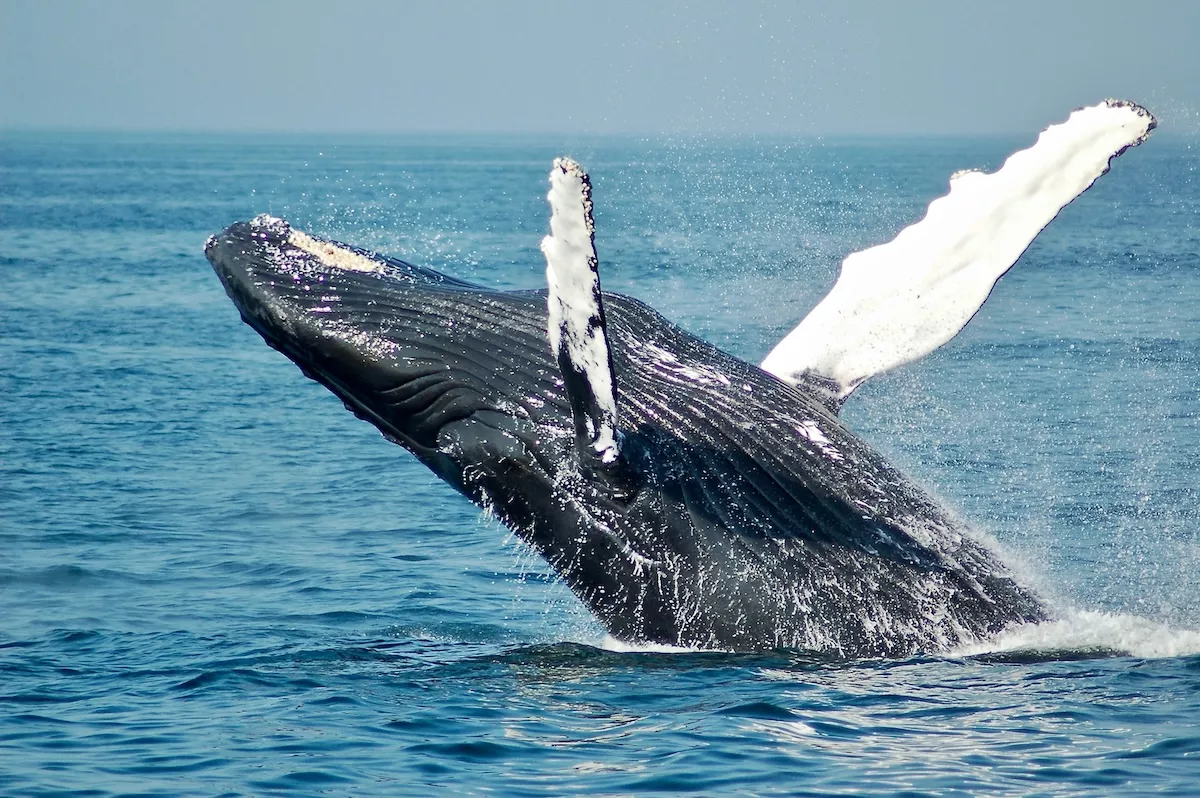
A Whale’s Eye and a Turning Point
One of the most powerful stories Watson shares is the moment that changed him forever.
“It was my first direct confrontation with whalers. We positioned ourselves between them and the whales — that standoff lasted about 20 minutes. Then they fired a harpoon over our heads. The harpoon struck one of the whales in the back, and she screamed — I never knew whales could scream like that. She rolled over in a fountain of blood, and for a moment, I thought she was going to launch herself onto our boat.
“In her final throws, I caught her eye… and what I saw there changed my life. That whale had the power to kill us — but she didn’t. She chose not to. I believe she understood what we were trying to do.”
That’s when aggressive intervention became a moral imperative.
Since then, Watson and his crew have shut down 90% of the world’s whaling operations. “Australia went from being a whaling nation to the whales’ greatest defender. That’s real change.”
A Prince, A Protest, and A Walkout in Monaco
Watson’s connection with Monaco dates back to 1997, when the International Whaling Commission held a meeting here.
“Prince Rainier invited us, and our ship docked right outside the meeting. I wasn’t allowed inside — I was banned. But then Prince Albert came aboard and gave me a personal invitation to the reception for the delegates.”
The result? The entire Japanese and Norwegian delegations walked out in protest.
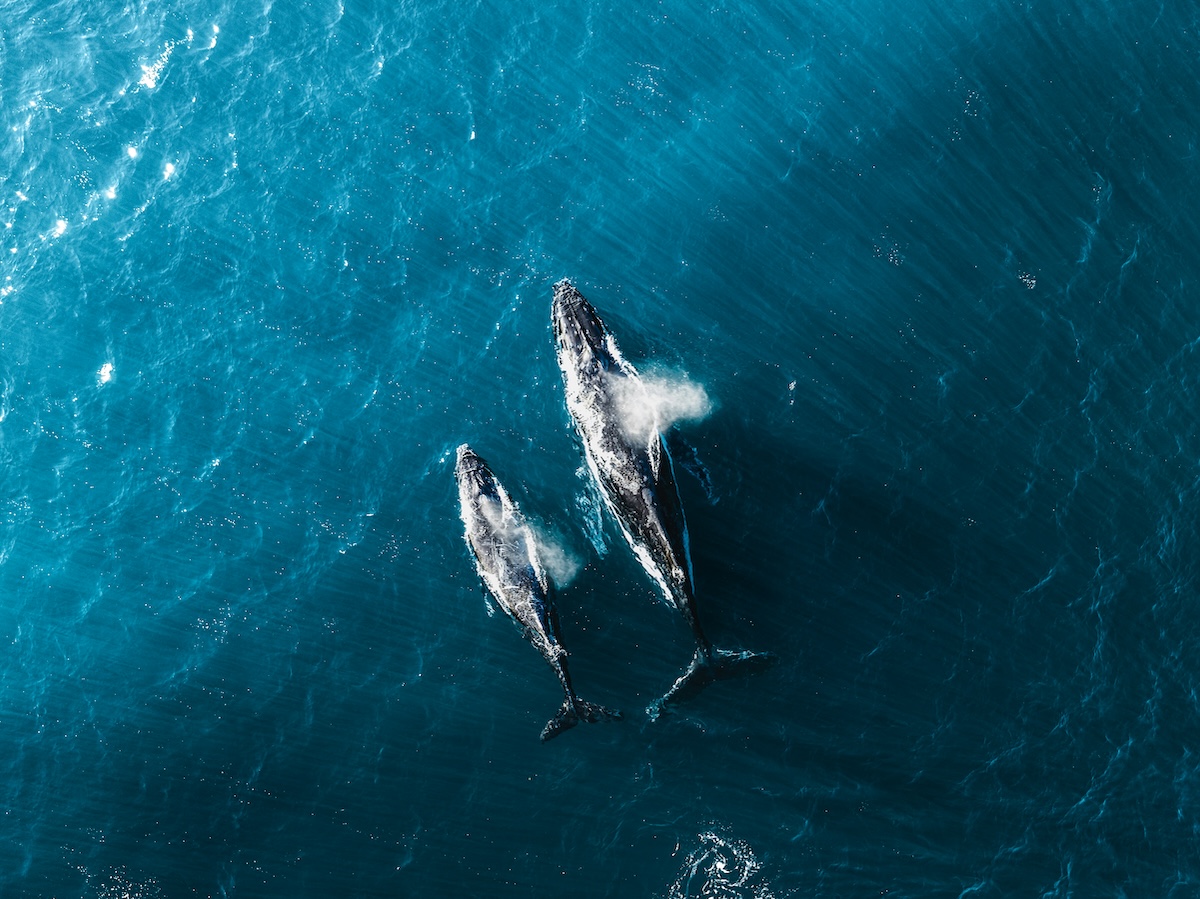
The poet behind the pirate
Watson has been arrested multiple times — in Newfoundland, the Netherlands, and most recently in Greenland in 2024, on a 14-year-old Interpol Red Notice initiated by Japan. The charge? “Conspiracy to trespass and obstruct business,” he says, “over actions where no one was hurt and nothing was stolen.” The Red Notice system, typically reserved for war criminals and drug lords, had been weaponised against an ocean activist. “They were furious about our Southern Ocean campaigns,” he adds.
He spent five months in detention, during which France, Brazil, and French Polynesia came to his defence. Even President Emmanuel Macron reached out personally. “He said I would always be safe in France”. Interpol eventually ruled the charges politically motivated, and Watson’s freedom was restored.
“Every situation can be used as an opportunity,” he reflects. “My arrest in Greenland brought global attention back to Japanese whaling and the killing of dolphins in the Faroe Islands.” During his time in custody, he received more than 7,000 letters and tried to answer as many as he could. He smiles, quoting Gandhi: “Going to jail is a good time to catch up on your reading and writing.” He used that time to write — not only books, but poetry. “Writing keeps me centred,” he says. “Poetry — that’s what keeps me safe.”
And as for the pirate label? “A U.S. federal judge officially called me one. I’ll take it. Pirates, after all, challenge empires.”
When Fame Becomes a Liability
In 2022, Watson was ousted from Sea Shepherd — the organisation he founded — due to growing corporate discomfort with his confrontational methods.
“Because of the success of the TV shows Whale Wars, we attracted major funding, including from insurance companies and lotteries. And suddenly, I became a liability. Too controversial. Too confrontational.”
A court later ruled his dismissal illegal, and Sea Shepherd France, Brazil, and the UK remained loyal to the philosophy of aggressive non-violence. So, Watson set up the Captain Paul Watson Foundation to continue the original mission.
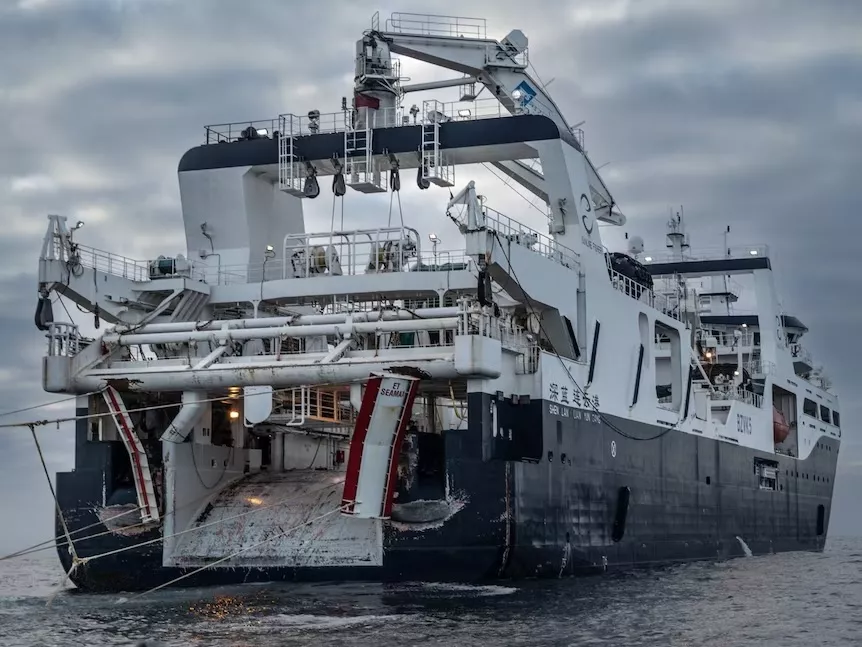
The Foundation’s New Frontlines
With two ships now under his command, Paul Watson’s foundation continues its direct-action campaigns in hotspots around the globe — from protecting sea turtle hatchlings in Central America to confronting dolphin and whale hunts in Japan and the Faroe Islands.
But his most urgent fight now lies in the Southern Ocean.
“We saved the whales in the Southern Ocean, but now they’re being threatened by these krill harvesters,” he says. “They’re pulling out 650,000 tonnes a year — the base of the food chain for whales, penguins, seals — and turning it into a cheap protein paste for salmon farms and chicken feed. It’s just another case of exploitation of all living things in the ocean for the purpose of making money.”
Watson plans to bring the issue to COP30 in Brazil, backed by President Lula, as his Foundation pushes to make krill trawling a defining battleground in ocean conservation.
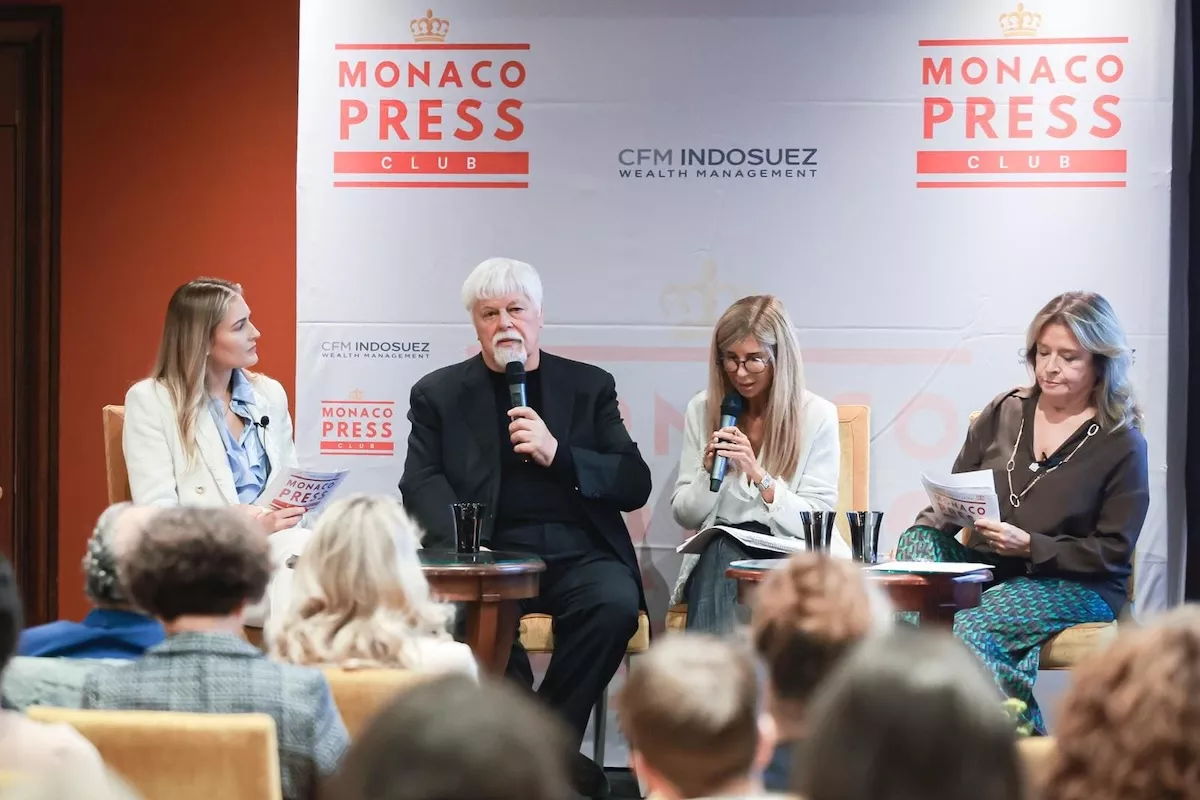
Legacy and imagination
When asked what he hopes his legacy will be, he hesitates. “I’ve never really thought about it. It’s not for me to define.”
But he smiles as he recalls some of the people who’ve crewed for him — over 5,000 volunteers in total. “One of my crew, Alex Pacheco, was 18 when he joined us. After our campaign against the pirate whaler Sierra, he told me he wanted to do something about the way chimpanzees were treated in labs. I told him, ‘Then do it.’ He went home, infiltrated a lab, exposed the cruelty, shut it down, and founded PETA. That’s the point — to inspire people to act.”
He pauses before adding quietly:
“The strength of an ecosystem is in diversity. The strength of a movement is, too. Real change comes from individuals who are inspired by passion, courage, and imagination. That’s what changes things, not governments.
“So if you see something that you really love – an ecosystem or a species – in danger, then do something about it. You really can make a difference.”
Stay updated with Monaco Life: sign up for our free newsletter, catch our podcast on Spotify, and follow us across Facebook, Instagram, LinkedIn, and Tik Tok.
Photo source: Monaco Press Club
